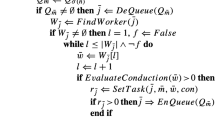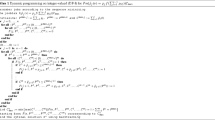Abstract
In the context of Industry 4.0, both of the ability to handle unexpected events and personalization customization are emphasized. This work investigates a parallel machine scheduling problem with uncertain skill requirements. The problem involves a two-stage decision-making process: (i) determining the workers’ skill training plan and the number of opened machines on the first stage before the realization of uncertain skill requirements, and (ii) scheduling jobs and assigning workers to jobs on the second stage, under known skill requirements. The objective is to minimize the expected total cost, including the workers’ skill training cost, machine opening cost and the expected penalty cost of jobs’ tardiness. A two-stage stochastic programming formulation is proposed, and an illustrative example shows the applicability of the model.
Access this chapter
Tax calculation will be finalised at checkout
Purchases are for personal use only
Similar content being viewed by others
References
Al-Khamis, T., M’Hallah, R.: A two-stage stochastic programming model for the parallel machine scheduling problem with machine capacity. Comput. Oper. Res. 38(12), 1747–1759 (2011)
Celano, G., Costa, A., Fichera, S.: Scheduling of unrelated parallel manufacturing cells with limited human resources. Int. J. Prod. Res. 46(2), 405–427 (2008)
Chaudhry, I.A.: Minimizing flow time for the worker assignment problem in identical parallel machine models using GA. Int. J. Adv. Manuf. Technol. 48(5–8), 747–760 (2010)
Chaudhry, I.A., Drake, P.R.: Minimizing total tardiness for the machine scheduling and worker assignment problems in identical parallel machines using genetic algorithms. Int. J. Adv. Manuf. Technol. 42(5), 581–594 (2009)
Costa, A., Cappadonna, F.A., Fichera, S.: A hybrid genetic algorithm for job sequencing and worker allocation in parallel unrelated machines with sequence-dependent setup times. Int. J. Adv. Manuf. Technol. 69(9), 2799–2817 (2013). https://doi.org/10.1007/s00170-013-5221-5
Dolgui, A., Ivanov, D., Sethi, S.P., Sokolov, B.: Scheduling in production, supply chain and industry 4.0 systems by optimal control: fundamentals, state-of-the-art and applications. Int. J. Prod. Res. 57(2), 411–432 (2019)
Dong, C., Chen, M., Wan, G.: Parallel machine selection and job scheduling to minimize machine cost and job tardiness. Comput. Oper. Res. 32(8), 1995–2012 (2005)
Edis, E.B., Oguz, C., Ozkarahan, I.: Parallel machine scheduling with additional resources: notation, classification, models and solution methods. Eur. J. Oper. Res. 230(3), 449–463 (2013)
Gorecky, D., Schmitt, M., Loskyll, M., Zühlke, D.: Human-machine-interaction in the industry 4.0 era. Manage. Sci. 23(6), 595–605 (2014)
Hofmann, E., Rüsch, M.: Industry 4.0 and the current status as well as future prospects on logistics. Comput. Ind. 89, 23–34 (2017)
Ji, M., Cheng, T.C.E.: Parallel-machine scheduling with simple linear deterioration to minimize total completion time. Eur. J. Oper. Res. 188(2), 342–347 (2008)
Liu, M., Liu, X., Chu, F., Zhang, E., Chu, C.: Service-oriented robust worker scheduling with motivation effects. Int. J. Prod. Res. (2020). https://doi.org/10.1080/00207543.2020.1730998
Liu, M., Liu, X., Chu, F., Zheng, F., Chu, C.: Service-oriented robust parallel machine scheduling. Int. J. Prod. Res. 57(12), 3814–3830 (2019)
Longo, F., Nicoletti, L., Padovano, A.: Smart operators in industry 4.0: a human-centered approach to enhance operators’ capabilities and competencies within the new smart factory context. Comput. Ind. Eng. 113, 144–159 (2017)
Machado, C.G., Winroth, M.P., Ribeiro da silva, E.H.D.: Sustainable manufacturing in industry 4.0: an emerging research agenda. Int. J. Prod. Res. 58(5), 1462–1484 (2020)
Pan, Q.K., Suganthan, P.N., Chua, T.J., Cai, T.X.: Solving manpower scheduling problem in manufacturing using mixed-integer programming with a two-stage heuristic algorithm. Int. J. Adv. Manuf. Technol. 46(9–12), 1229–1237 (2010)
Pinedo, M., Hadavi, K.: Scheduling: Theory. Algorithms and Systems. Springer, Berlin (1992). https://doi.org/10.1007/978-1-4614-2361-4
Rosin, F., Forget, P., Lamouri, S., Pellerin, R.: Impacts of industry 4.0 technologies on lean principles. Int. J. Prod. Res. 58(6), 1644–1661 (2020)
Rossit, D.A., Tohmé, F., Frutos, M.: Industry 4.0: smart scheduling. Int. J. Prod. Res. 57(12), 3802–3913 (2018)
Vallada, E., Ruiz, R.: A genetic algorithm for the unrelated parallel machine scheduling problem with sequence dependent setup times. Eur. J. Oper. Res. 211(3), 612–622 (2011)
Wang, Y., Ma, H.-S., Yang, J.-H., Wang, K.-S.: Industry 4.0: a way from mass customization to mass personalization production. Adv. Manuf. 5(4), 311–320 (2017). https://doi.org/10.1007/s40436-017-0204-7
Xu, X., Cui, W., Lin, J., Qian, Y.: Robust makespan minimisation in identical parallel machine scheduling problem with interval data. Int. J. Prod. Res. 51(12), 3532–3548 (2013)
Yang, D.L., Cheng, T.C.E., Yang, S.J.: Parallel-machine scheduling with controllable processing times and rate-modifying activities to minimise total cost involving total completion time and job compressions. Int. J. Prod. Res. 52(4), 1133–1141 (2014)
Yin, Y., Stecke, Kathryn, E., Li, D.: The evolution of production systems from industry 2.0 through industry 4.0. Int. J. Prod. Res. 56(1–2), 848–861 (2018)
Zhang, J., Ding, G., Zou, Y., Qin, S., Fu, J.: Review of job shop scheduling research and its new perspectives under industry 4.0. J. Intell. Manuf. 30, 1809–1830 (2017)
Acknowledgements
This work is supported by the National Natural Science Foundation of China (NSFC) under Grants 72021002, 71771048, 71432007, 71832001 and 72071144.
Author information
Authors and Affiliations
Corresponding author
Editor information
Editors and Affiliations
Rights and permissions
Copyright information
© 2021 IFIP International Federation for Information Processing
About this paper
Cite this paper
Liu, X., Liu, M. (2021). Parallel Machine Scheduling withStochastic Workforce Skill Requirements. In: Dolgui, A., Bernard, A., Lemoine, D., von Cieminski, G., Romero, D. (eds) Advances in Production Management Systems. Artificial Intelligence for Sustainable and Resilient Production Systems. APMS 2021. IFIP Advances in Information and Communication Technology, vol 632. Springer, Cham. https://doi.org/10.1007/978-3-030-85906-0_29
Download citation
DOI: https://doi.org/10.1007/978-3-030-85906-0_29
Published:
Publisher Name: Springer, Cham
Print ISBN: 978-3-030-85905-3
Online ISBN: 978-3-030-85906-0
eBook Packages: Computer ScienceComputer Science (R0)





